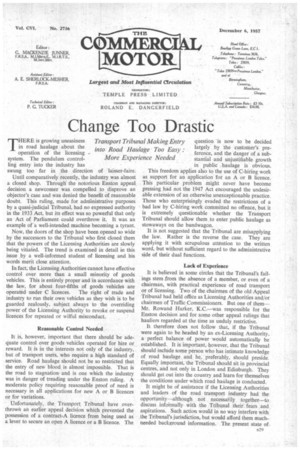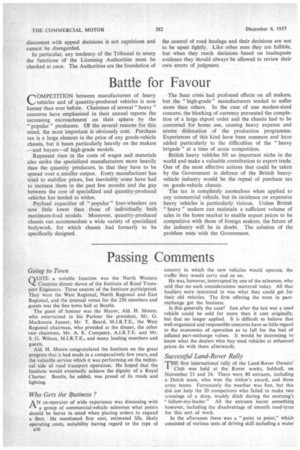Change Too Drastic
Page 35

Page 36

If you've noticed an error in this article please click here to report it so we can fix it.
THERE is growing uneasiness in road haulage about the operation of the licensing system. The pendulum controlling entry into the industry has swung too far in the direction of laisser-faire.• Until comparatively recently, the industry was almost a closed shop. Through the notorious Enston appeal decision a newcomer was compelled to disprove an objector's case and was denied the benefit of reasonable doubt. This ruling, made for adniinistrative purposes by a quasi-judicial Tribunal, had no expressed authority in the 1933 Act, but its effect was so powerful that only an Act of Parliament could overthrow it. It was an example of -a well-intended machine becoming a tyrant.
Now, the doors of the shop have been opened so wide by the successors to the Tribunal who first closed them that the powers of the Licensing Authorities are slowly being vitiated. The trend is examined in detail in this issue by a well-informed student of licensing and his words merit close attention.
In fact, the Licensing Authorities cannot have effective control over more than a small minority of goods vehicles. This is entirely proper and in accordance with the taw, for about four-fifths of goods vehicles are operated under C licences. The right of trade and industry to run their own vehicles as they wish is to be guarded zealously, subject always to the overriding power of the Licensing Authority to revoke or suspend licences for repeated or wilful misconduct.
Reasonable Control Needed It is, however, important that there should be adequate control over goods vehioles operated for hire or reward. It is in the interests not only of the industry, but of transport users, who require a high standard of service. Road haulage should not be so restricted that the entry of new blood is almost impossible. That is the road to stagnationand is one which the industry was in danger of treading under the Enston ruling. A moderate policy requiring reasonable proof of need is necessary in all applications for new A or B licences or for variations.
Unfortunately, the Transport Tribunal have overthrown an earlier appeal decision which prevented the possession of a contract-A licence from being used as a lever to secure an open A licence or a B licence. The question is now to be decided largely, by the customer's preference, and the danger of a substantial and unjustifiable growth in public haulage is obvious.
This freedom applies also to the use of C-hiring work as support for an application for an A or B licence. This particular problem might never have become pressing had not the 1947 Act encouraged the undesirable extension of an otherwise unexceptionable practice. Those who enterprisingly evaded the restrictions of a bad law by C-hiring work committed no offence, but it is extremely questionable whether the Transport Tribunal should allow them to enter public haulage as stowaways on the bandwagon.
It is not suggested that the Tribunal are misapplying the law. Rather is the reverse the case. They are applying it with scrupulous attention to the written word, but without sufficient regard to the administrative side of their dual functions.
Lack of Experience It is believed in some circles that the Tribunal's failings stem from the absence of a member, or even of a chairman, with practical experience of road transport or of licensing. Two of the chairmen of the old Appeal Tribunal had held office as Licensing Authorities and/or chairmen of Traffic Commissioners. But one of them— Mr. Rowand Harker, K.C.—was responsible for the Enston decision and for some other appeal rulings that hauliers regarded at the time as unduly restrictive.
It therefore does not follow that, if the Tribunal were again to be headed by an ex-Licensing Authority, a perfect balance of power would automatically be established. It is important,however, that the Tribunal should include some person who has intimate knowledge of road haulage and he, preferably, should preside. Equally important, the Tribunal should sit in provincial centres, and not only in London and Edinburgh. They should get out into the country and learn for themselves the conditions under which road haulage is conducted.
It might be of assistance if the Licensing Authorities and leaders of the road transport industry had the opportunity—although not necessarily together—to discuss •infoimally with the Tribunal their fears and aspirations. Such action would in no way interfere with , the Tribunal's jurisdiction, but would afford them muchneeded background information. The present state of discontent with appeal decisions. is not capricious and cannot be disregarded.
In particular, any tendency of the Tribunal to usurp the functions of the Licensing Authorities must be checked at once. The Authorities are the foundation of the control of road haulage and their decisions are not to be upset lightly. Like other men they are fallible, but when they reach decisions based on inadequate evidence they should always be allowed to review their own errors of judgment.
























































































































